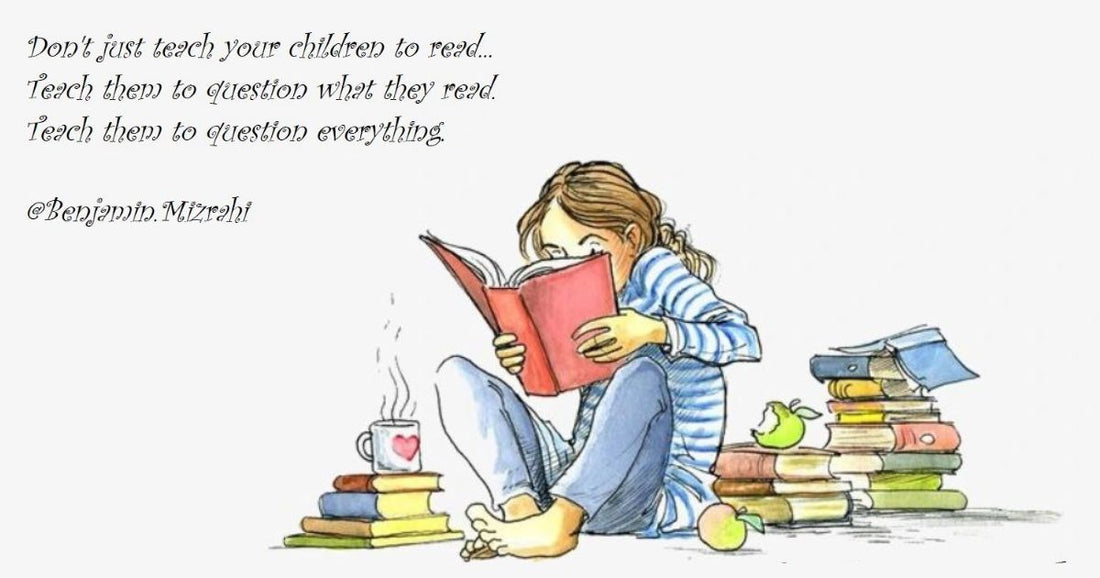
Teach Critical Thinking to Your Kids
Share
Critical thinking is the ability to make reasoned judgments based on logic and evidence. Instead of accepting information at face value, it encourages questioning, analysis, and open-mindedness. A strong critical thinker doesn’t just ask, What is being said? but also, How do we know this is true? Is it based on facts or opinions? Are there other possible explanations?
At its core, critical thinking relies on three essential skills. Curiosity drives the desire to learn, explore ideas, and seek evidence. Skepticism helps in questioning information rather than accepting it blindly. Humility allows individuals to reconsider their opinions when faced with new, convincing evidence. When children develop these skills, they learn to think independently, make informed decisions, and approach problems with confidence.
The Traits of a Strong Critical Thinker
A well-developed critical thinker engages deeply with information. They ask meaningful questions, analyze problems clearly, and gather relevant data before forming conclusions. Instead of rushing to judgment, they consider different perspectives, test ideas against standards, and communicate effectively to solve complex problems.
Critical thinkers don’t just look for answers—they explore possibilities. They learn to identify flawed reasoning, challenge assumptions, and recognize when an argument lacks supporting evidence. These skills are essential not only in academics but also in everyday life, where making sound decisions is crucial.
6 Essential Critical Thinking Skills (and How to Develop Them)
Identifying the Issue
The first step in critical thinking is recognizing a problem, understanding the factors that influence it, and defining the key elements involved. Before jumping to solutions, children should take a step back and assess the situation from all angles. Encouraging them to ask, What is happening? Who is involved? What are the possible outcomes? can help them develop a structured approach to problem-solving.
Researching and Evaluating Information
Not all information is accurate or reliable. Teaching children to verify facts, cross-check sources, and question the credibility of what they hear or read is essential. In a world where misinformation spreads quickly, developing research skills helps them distinguish between facts and opinions. They should learn to ask, Where did this information come from? Is the source trustworthy? What evidence supports this claim? Encouraging independent research and fact-checking can strengthen their ability to make informed decisions.
Recognizing Bias and Objectivity
Bias exists in media, personal opinions, and even educational materials. Critical thinkers must learn to recognize bias in both themselves and the information they consume. It’s important to help children understand that everyone has perspectives shaped by experiences, but evaluating information objectively allows for better decision-making. Asking questions like, Who benefits from this claim? Is there missing or ignored information? can help them develop a more balanced view of any topic.
Drawing Logical Conclusions
Information is not always presented with clear conclusions, so children must learn how to infer meaning from the facts they are given. This skill allows them to predict outcomes, connect ideas, and make sense of complex situations. However, not all inferences are accurate, which is why it’s crucial to teach them to gather as much evidence as possible before drawing conclusions. Encouraging them to think critically before making assumptions strengthens their reasoning skills.
Determining What Matters
When presented with a large amount of information, it can be difficult to determine what is truly relevant. Developing the ability to focus on the most important details is key to critical thinking. Children should learn to filter out distractions and identify key points that contribute to solving a problem. One useful technique is creating a list of facts in order of importance, which can help them visually assess what information is essential and what can be set aside.
Cultivating Curiosity
Curiosity fuels critical thinking. Encouraging children to ask why and how fosters an active learning mindset. Many kids naturally ask questions, but as they grow older, they may become hesitant to question things. Reinforcing their natural curiosity by responding positively to their inquiries—That’s a great question! Let’s explore the answer together! —can help keep their critical thinking skills sharp.
The Impact of Critical Thinking
Teaching children to think critically equips them with skills that will serve them throughout their lives. It allows them to make better decisions, analyze situations with clarity, and communicate their thoughts effectively. Whether in academics, careers, or daily life, the ability to evaluate information thoughtfully is invaluable.
By fostering curiosity, encouraging thoughtful questioning, and helping children develop a habit of analyzing information, we can empower them to navigate an increasingly complex world with confidence. Providing opportunities for open discussions, engaging them in problem-solving activities, and guiding them through real-world examples can make a lasting impact on their ability to think critically.
Would you like ideas on how to integrate critical thinking activities into daily routines? Let’s explore more ways to build these essential skills!
Coach Benjamin Mizrahi. Educator. Learning Specialist. Family Coach. Father. Husband.
More articles on EXECUTIVE FUNCTIONS COACHING – Benjamin Mizrahi
